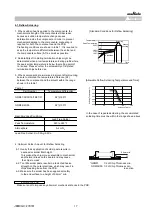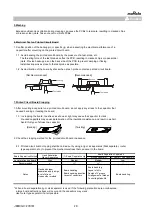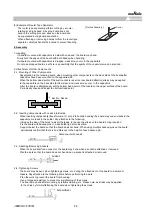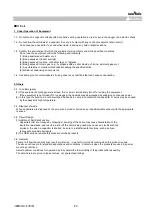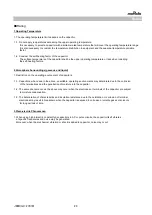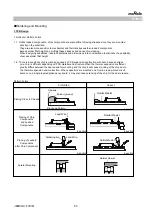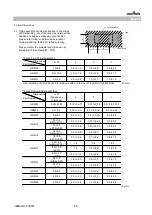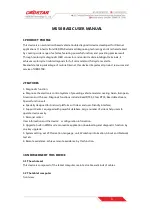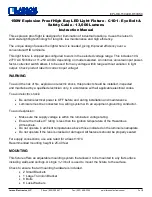
Caution
■
Limitation of Applications
Please contact us before using our products for the applications listed below which require especially high reliability
for the prevention of defects which might directly cause damage to the third party's life, body or property.
①
Aircraft equipment
②
Aerospace equipment
③
Undersea equipment
④
Power plant control equipment
⑤
Medical equipment
⑥
Transportation equipment(vehicles,trains,ships,etc.)
⑦
Traffic signal equipment
⑧
Disaster prevention / crime prevention equipment
⑨
Data-processing equipment
⑩
Application of similar complexity and/or reliability requirements to the applications listed in the above.
■
Storage and Operation condition
1. The performance of chip monolithic ceramic capacitors may be affected by the storage conditions.
1-1. Store the capacitors in the following conditions: Room Temperature of +5
℃
to +40
℃
and a Relative Humidity
of 20% to 70%.
(1) Sunlight, dust, rapid temperature changes, corrosive gas atmosphere or high temperature and humidity
conditions during storage may affect solderability and packaging performance.
Therefore, please maintain the storage temperature and humidity. Use the product within six months,
as prolonged storage may cause oxidation of the electrodes.
(2) Please confirm solderability before using after six months.
Store the capacitors without opening the original bag.
Even if the storage period is short, do not exceed the specified atmospheric conditions.
1-2. Corrosive gas can react with the termination (external) electrodes or lead wires of capacitors, and result
in poor solderability. Do not store the capacitors in an atmosphere consisting of corrosive gas (e.g.,hydrogen
sulfide, sulfur dioxide, chlorine, ammonia gas etc.).
1-3. Due to moisture condensation caused by rapid humidity changes, or the photochemical change caused
by direct sunlight on the terminal electrodes and/or the resin/epoxy coatings, the solderability and
electrical performance may deteriorate. Do not store capacitors under direct sunlight or in high huimidity
conditions
■
Rating
1.Temperature Dependent Characteristics
1. The electrical characteristics of the capacitor can change with temperature.
1-1. For capacitors having larger temperature dependency, the capacitance may change with temperature
changes. The following actions are recommended in order to ensure suitable capacitance values.
(1) Select a suitable capacitance for the operating temperature range.
(2) The capacitance may change within the rated temperature.
When you use a high dielectric constant type capacitors in a circuit that needs a tight (narrow) capacitance
tolerance (e.g., a time-constant circuit), please carefully consider the temperature characteristics, and
carefully confirm the various characteristics in actual use conditions and the actual system.
[Example of Temperature Caracteristics R7] [Example of Temperature Characteristics R6]
Sample: 0.1μF, Rated Voltage 50VDC Sample: 22μF, Rated Voltage 4VDC
!
-20
-10
-15
-5
5
0
10
15
20
Temperature (
C)
-75
-50
-25
0
25
50
75
100 125 150
C
a
p
a
ci
ta
n
ce
C
h
a
n
g
e
(
%
)
-20
-10
-15
-5
5
0
10
15
20
Temperature (
C)
-75
-50
-25
0
25
50
75
100
C
a
p
a
ci
ta
n
ce
C
h
a
n
g
e
(
%
)
JEMCGC-2701W
12

















